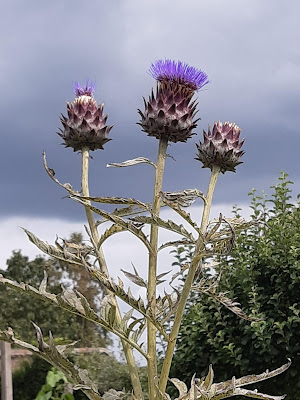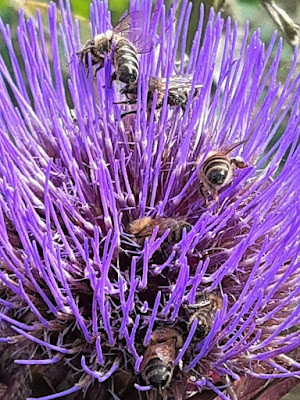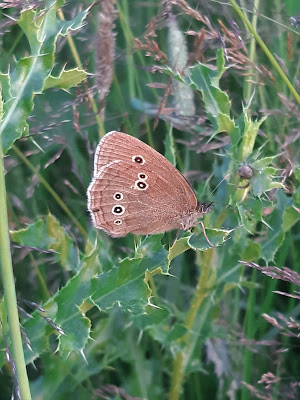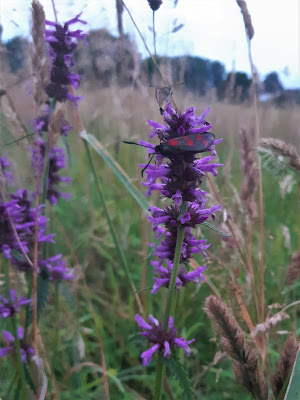When we reach our patch of edgelands, where we've walked our dogs through the pandemic, it's like entering another world. Sometimes it even feels like we're going through a portal.
It's a special place, not least because it's on the edge of a city and the edge of a country. (We call that 'liminal' in the poetry trade.) It also straddles two counties - the City and County of Bristol, and South Gloucestershire, which was just Gloucestershire when I was a child. (It said so on our school exercise books.) However, it's only recently that I noticed this milestone tucked away by a hedge at the top of the lane leading to it.
The main characteristic of edgelands is that they're always changing, whether by the agency of man or nature. Our patch stopped being countryside when industry - in particular, the aeroplane industry - came to town. Now the air field where the rural village of Charlton once stood is being developed into the vast new neighbourhood of Brabazon, taking the few remaining fields with it. We've been walking on the part of Charlton Common and some of the fields that will soon be lost, and are therefore liminal in time as well as space. It seems important to record them.
They stretch, in part, from Cribbs Causeway, above, in the distance ...
... to Fishpool Lane on the horizon, and as far beyond.
Look, a farmer left a collie dog behind ... oh, it's ours
There was more proof in the fields (in addition to the bits of cleaned-out hedgehog skin we came across recently) of the presence of badgers. I've read documents online and the council is aware of the need for 'green corridors' to enable the wildlife to move around, but I can't help wondering what will happen to them, especially during the building work.
The two cranes on the airfield feature often in my photos of sunsets taken from the meadow; here they are a lot closer.

I'm so sad it's sunset for these peaceful fields and the life that inhabits them.
The footpath along the embankment and that fallow field will also disappear under tarmac and concrete. In contrast to the farmland, they've hosted a wide range of wildflowers this year, and constitute an even bigger loss.
Meanwhile, the verges of the country lane leading to the remnants of Charlton village have been hacked back, and it's now possible to see into the impenetrable part of the Common, which will soon be opened up as a sop to locals miffed at losing the path along the embankment - but again at a cost to the wildlife living there.
Talking of wildlife, it's been quiet in the meadow and the Small Dark Wood of the Mind. We've seen the odd fox but nowhere near as many as last year; I think the drastic cutting back of scrub from the margins of the meadow just before Christmas made making dens there an unattractive proposition, for this year at least. We've seen a couple of roe deer recently, including one memorable time when Cwtch startled one in the wood and it bounded through the vortex of trees and light and disappeared. (No photo, it was over far too quickly and anyhow it was too exciting to look away.)
We've also heard the tawny owl again, this time at a far more respectable hour for a night bird, ie the evening.
More human intervention of the sort that impacts on wildlife happened in the meadow, when someone decided to 'help' the hollowing oak shed its core of rotten wood, thus depriving insects and larvae of homes and hiding places. I can only think it was like picking a scab for them, but why can't we just let things be?
We don't always see a lot of insects up the meadow because we usually walk in the evening, but here's some we've spotted:
Red soldier beetles
Gatekeeper
Skipper
Ringlet
Marbled white (with a tattered wing)
Five-spot burnet moth on betony
Buff-tailed bumblebee on ragwort
The vegetation, some of which towered over me in June and early July, is now dying back, but still beautiful against the shifting sky..
... while the late summer flowers have come, flourished and are mostly gone, though yarrow, ragwort, fleabane and carrot still prevail.
yarrow
a constellation of carrots

carrots at the mad hatter stage
Often the air is full of thistledown.
I missed this burdock till now among the ranks of creeping thistles, but burdock it definitely is, look at those leaves.
Hogweed still has a presence, but bearing seeds now instead of flowers.
There was a brief flurry of perennial cornflowers in the middle of the meadow ...
... followed by betony ...
... which were themselves surrounded by legions of cinquefoil, so pleasing to the eye.
dock leaves
carrots, fleabane, hemp agrimony, ragwort, loosestrife, reedmace, common reed
It's been quite a cloudy summer, and I haven't really had a sense of watching the setting sun roll back along the top of the hills towards winter, though I've sat on the earth - or some of the rotten wood pulled from the tree - when the weather's permitted and glimpsed its journey.
A glance of sun highlighting Mynydd Machen
After-glow from the golf course
Cwtch, torn between two golf balls, feelin' such a fool ...























































































